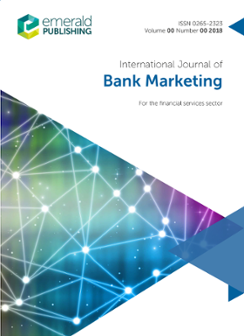Intensifying materialism through buy-now pay-later (BNPL): examining the dark sides
IF 6.3
3区 管理学
Q1 BUSINESS
引用次数: 0
Abstract
PurposeBuy-now, pay-later (BNPL) services can put consumers into a debt trap by encouraging consumers to buy things they cannot afford, leading to a culture of materialism and consumerism. Therefore, this research aims to investigate how materialism can influence BNPL use and impulsive and compulsive buying. Additionally, the authors examine if BNPL use and impulsive buying mediate between materialism and compulsive buying.Design/methodology/approachData from 556 participants were collected through a structured questionnaire via an online survey. Structural equation modeling (SEM) using SMART PLS 4 was employed to analyze the relationship between variables and to test the proposed hypotheses.FindingsMaterialism impact BNPL use and increases the inclination for impulse buying, precipitating compulsive buying behavior. However, BNPL use does not directly influence compulsive buying. The mediating relationship was identified, where BNPL use, and impulsive buying mediate the relationship between materialism and compulsive buying.Practical implicationsBNPL use alone does not inevitably lead to compulsive buying. The only way BNPL use could lead to compulsive buying is through impulsive buying. Therefore, BNPL service providers need to foster responsible buying habits due to the rise in impulsive buying, which, if not controlled, could lead to a debt trap resulting from compulsive buying.Originality/valueThis study contributes to the limited BNPL literature because there is speculation, but the scarcity of empirical evidence to substantiate, how materialism influences BNPL use and increases the inclination for impulse buying, precipitating compulsive buying behavior.通过先买后付强化唯物主义(BNPL):审视黑暗面
目的现在购买,以后付款(BNPL)服务会鼓励消费者购买他们买不起的东西,从而导致物质主义和消费主义文化,从而使消费者陷入债务陷阱。因此,本研究旨在探讨物质主义如何影响BNPL的使用以及冲动和强迫性购买。此外,作者还考察了BNPL的使用和冲动性购买是否介于物质主义和强迫性购买之间。设计/方法/方法556名参与者的数据是通过在线调查通过结构化问卷收集的。使用SMART PLS 4的结构方程建模(SEM)来分析变量之间的关系并检验所提出的假设。发现唯物主义影响了BNPL的使用,增加了冲动购买的倾向,引发了强迫性购买行为。然而,BNPL的使用并不会直接影响强迫性购买。确定了中介关系,其中BNPL的使用和冲动性购买中介了物质主义和强迫性购买之间的关系。实际含义单独使用BNPL并不会不可避免地导致强迫性购买。使用BNPL可能导致强迫性购买的唯一途径是冲动性购买。因此,由于冲动性购买的增加,BNPL服务提供商需要培养负责任的购买习惯,如果不加以控制,可能会导致强迫性购买导致的债务陷阱。原创性/价值这项研究有助于有限的BNPL文献,因为存在猜测,但缺乏实证证据来证实物质主义如何影响BNPL的使用,并增加冲动购买的倾向,从而引发强迫性购买行为。
本文章由计算机程序翻译,如有差异,请以英文原文为准。
求助全文
约1分钟内获得全文
求助全文
来源期刊

International Journal of Bank Marketing
BUSINESS-
CiteScore
10.70
自引率
18.90%
发文量
54
期刊介绍:
International Journal of Bank Marketing (IJBM) aims to publish papers that relate to the marketing challenges of financial services providers around the globe.
Preference is given to empirically-based research papers that expand on existing theories (or develop new ones) on customer behaviour in financial services settings.
In addition, the journal is interested in helping academicians and practitioners in the field to better understand the discipline of financial services marketing, and as a result review papers and thought pieces are invited for submission.
 求助内容:
求助内容: 应助结果提醒方式:
应助结果提醒方式:


